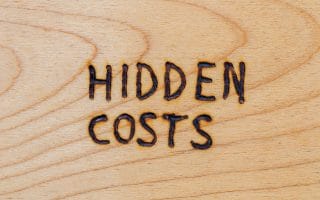We all know that depression is a terrible disease that can have an enormous psychological cost, both for the sufferer and their family and friends. But there is also a monetary cost to depression that goes beyond the medical and therapy bills. I’m not a doctor and I’m in no position to offer treatment advice or discuss symptoms. However, as this is the time of year when depression often gets worse or becomes more obvious with the shorter days and holiday stress, I want to point out some of the monetary costs of untreated depression.
Why is this important? First, some people are motivated more by money than other reasons. They may not seek treatment for medical reasons, but perhaps seeing the monetary costs of depression may inspire them to seek help. Untreated depression can be especially costly, as the sufferer often has no idea why they are incurring these costs or how to stop. This leads to a cycle of frustration that may worsen the depression as the costs mount. This is the second reason why this article is important. If you think you or someone you know is suffering from depression, it may help to understand what’s happening financially so that the cycle can be broken or at least slowed until treatment can bring relief.
Some costs associated with depression are incurred as people seek to self-medicate their depression. We may jokingly refer to “retail therapy,” but for some depressed people it’s no joke. They feel sad and miserable so they seek to buy newer, nicer things in the hope that the things will make them feel better and improve their lives. Relief, if any, is short lived because the problem can’t be solved with things. But the depressed person may continue to buy, hoping for just a tiny bit of relief; some glimmer or hope that things can be better. It can become an endless cycle. In extreme cases, depressed people can burn through their family’s funds, incur huge amounts of debt, and wreck their financial future buying things to make themselves feel better.
Depression can affect the sufferer’s earning power, as well. Depressed people may perform poorly at work, losing out on bonuses or performance raises. They may not be promoted because they are not seen as “go-getters” or “team players.” Their lack of interest in daily life may be taken as lack of interest in the job itself, leading to demotion or dismissal. Those who are self-employed may lose business due to poor performance. They may fail to attract new clients because they don’t have the energy or interest required to drum up new business. Their business may even go under, bringing on a whole new set of financial troubles.
There is also an opportunity cost to depression. Those who’ve always wanted to start their own business or turn a hobby into a money making venture may see those dreams crushed by depression. Starting a business requires a lot of energy; energy that depressed people just don’t have. Many depressed people give up on their dreams because it all seems too difficult. Those dreams fall by the wayside and, even if they are picked up again after treatment, the years of potential income are lost.
There are medical costs to depression that go beyond therapy and medication. Some depressed people have unexplained pain or illnesses. They go to the doctor seeking relief from the symptoms but the problem, the depression, remains untreated. The doctor treats the pain or the illness, but it will return or there will be a new pain or illness in the future until the depression is treated. Until then, the doctor’s visits continue to add up. Depressed people often stop exercising, caring for themselves, and seeking preventative care. This lack of preventative care can lead to many medical problems and their attendant expenses, particularly if the depression is left untreated for a prolonged period of time.
Finally, depressed people may not be able to properly manage their finances. They may lose interest in record keeping, resulting in missed payments, dropped insurance policies, late fees, and other charges. They may not have the energy to pay their bills, argue with customer service when they are charged incorrectly, or seek the best deals on services. These minor hassles can quickly add up and lead to ruined credit, higher rates, or cut off utilities. In a family where the main financial manager becomes depressed, the rest of the family will suffer unless someone else is willing and able to step in and take on that responsibility.
The psychological costs of untreated depression alone are terrible enough. Factor in the monetary costs as well, and this disease becomes even more crippling. Untreated depression can ruin a family’s finances, just as it ruins other aspects of life. If you or someone you know might be suffering from depression, I urge you to see a doctor for a treatment solution so that psychological and financial healing can begin.
Image courtesy of Felipe Morin

Jennifer Derrick is a freelance writer, novelist and children’s book author. When she’s not writing Jennifer enjoys running marathons, playing tennis, boardgames and reading pretty much everything she can get her hands on. You can learn more about Jennifer at: https://jenniferderrick.com/.







Comments